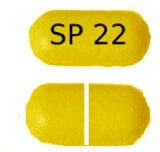Uses
Penbutolol is used to treat high blood pressure. Penbutolol is in a class of medications called beta blockers. It works by relaxing blood vessels and slowing heart rate to improve blood flow and decrease blood pressure.
Side Effects Of Penbutolol
Penbutolol may cause side effects. Tell your doctor if any of these symptoms are severe or do not go away:
- upset stomach
- diarrhea
- cough
- dizziness or lightheadedness
- excessive tiredness
- headache
- difficulty sleeping
- sweating
- decreased sexual ability
- memory loss
If you experience any of the following symptoms, call your doctor immediately:
- chest pain
- difficulty breathing or swallowing
- fainting
- slow or irregular heartbeat
- depression
- easy bruising or bleeding
Warnings & Precautions
Before taking penbutolol:
- tell your doctor and pharmacist if you are allergic to penbutolol or any other drugs.
- tell your doctor and pharmacist what prescription and nonprescription medications you are taking, especially medications for migraine headaches, asthma, allergies, colds, or pain; other medications for heart disease or high blood pressure; reserpine (Serpasil); and vitamins.
- tell your doctor if you have or have ever had asthma; diabetes; heart block; an overactive thyroid; or heart, lung, liver, or kidney disease.
- tell your doctor if you are pregnant, plan to become pregnant, or are breast-feeding. If you become pregnant while taking penbutolol, call your doctor.
- if you are having surgery, including dental surgery, tell your doctor or dentist that you take penbutolol.
Penbutolol Dosage
Penbutolol comes as a tablet to take by mouth. It is usually taken once a day. Follow the directions on your prescription label carefully and ask your doctor or pharmacist to explain any part you do not understand. Take penbutolol exactly as directed. Do not take more or less of it or take it more often than prescribed by your doctor.
Penbutolol helps control your condition but will not cure it. Continue to take penbutolol even if you feel well. Do not stop taking penbutolol without talking to your doctor.
Other
Keep all appointments with your doctor and the laboratory.
Your blood pressure should be checked regularly to determine your response to penbutolol. Your doctor may ask you to check your pulse (heart rate). Ask your pharmacist or doctor to teach you how to take your pulse. If your pulse is faster or slower than it should be, call your doctor.
Do not let anyone else take your medication. Ask your pharmacist any questions you have about refilling your prescription.
It is important for you to keep a written list of all of the prescription and nonprescription (over-the-counter) medicines you are taking, as well as any products such as vitamins, minerals, or other dietary supplements. You should bring this list with you each time you visit a doctor or if you are admitted to a hospital. It is also important information to carry with you in case of emergencies.
Source
All information has been provided courtesy of MedLinePlus from the National Library of Medicine and from the FDA.



